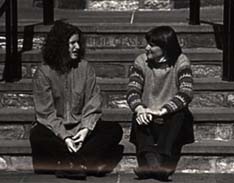Women's Mentoring Program Gains Momentum on Campus

Shira Ovide, '98 and Jenni Punt, assistant porfessor of biology, were one of 21 pairs of professors and students to participate this year in a new women's mentoring program on campus.
Details
You enter college at 18 and for the majority of the next four years you live, eat and sleep in a world made up almost exclusively of people your own age grappling with the same questions: What am I going to do with my life and how am I going to do it?
If you're a woman, the questions can get even more complicated: How am I going to reach my goals and possibly have a family along the way? What other obstacles will I encounter in the business and the academic world as a female?
These questions prompted Haverford senior Beth Cooper Benjamin to realize that Haverford women needed to better take advantage of a resource most faced every day at the head of their classrooms - their female professors.
Cooper Benjamin attended a women's leadership conference in Washington, D.C. last year where participants discussed how women could better help one another on college campuses through establishing better relationships with their female professors.
So last fall, Cooper Benjamin and five other Haverford female students formed a new group on campus called WoMentoring which matches female undergraduates with female professors in a one-to-one mentoring program. Its goals are simple: camaraderie, support and advice from someone whose "been there, done that."
Cooper Benjamin and fellow WoMentoring organizer Rachel Batsford, '98 said they noticed male college students generally seem to more freely form friendships with their male professors, but that fellow female students seemed to be reticent to do the same with female professors.
"It's more common to see males taking their professors out for a cup of coffee," Batsford explained. "I personally would not have thought about doing that with one of my professors."
Other WoMentoring organizers said they realized what they were missing after they attended a women's tea at the college last year.
"It was so much fun and so relaxed," explained Lizbeth Ginsburg '99, noting the only other time female professors and students gathered together in a larger social setting was during the annual senior women's dinner - an event which occurred just weeks before students left the campus for good.
Twenty-one partnerships have since been organized through the WoMentoring program. Students are paired with volunteer professors after completing a questionnaire that tries to match similar issues or concerns - and the concerns aren't just about academics.
"We had someone who asked to be paired with a professor who was the first woman to go to college in her family," Cooper Benjamin explained. "Another asked for a partner who had a child, and another asked for a partner she felt she could hug."
So far the pairings have not only made for interesting conversation, but for some great teas and lunches.
"Food is a crucial element," joked Jenni Punt, an alumna of Bryn Mawr and an assistant professor of biology at Haverford who often meets for lunch with her mentee Shira Ovide, '98, a political science major.
"I find the mentees to be as much of a teacher to me as I am to them," she said, noting the camaraderie is extremely refreshing to her since she came to Haverford after working in a big research institution.
"I've been craving this kind of relationship with students," Punt said.
Heidi Jacob, an assistant professor of music and director of the Bryn Mawr-Haverford Orchestra, said she wished she had this type of opportunity when she was younger.
"I really do feel it is important for women to have someone to talk with about things like career and family," Jacob said, noting her mentee is very concerned about being able to balance both.
WoMentoring organizers are quick to point out that they feel men and women are treated equally on Haverford's campus - it's just that women need to make more of an effort to help one another.
"This isn't about making up some disparity between males and females on campus," Cooper Benjamin explained. "It's about having an opportunity to look with other woman at issues that affect women in academics and afterward."
WoMentoring organizers said they are also hoping to expand the program to include female Philadelphia-area alumni as mentors for students.
"Women don't tend to form mentor relationships easily," said Batsford. "This makes it much easier."



